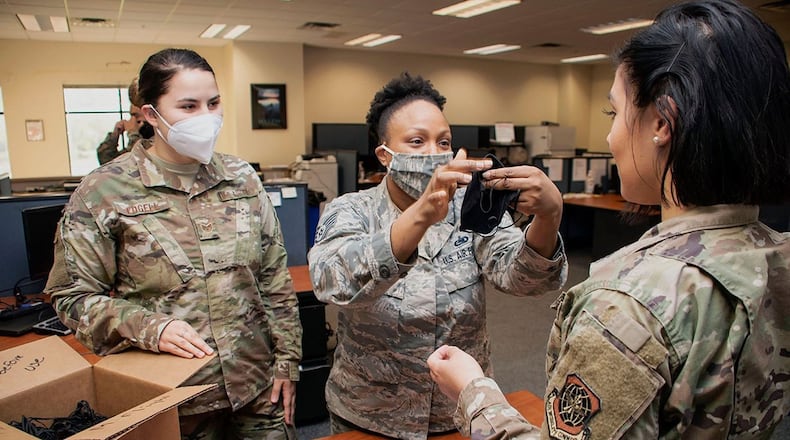Following the April 5 release of a Secretary of Defense memo on the use of cloth face coverings on Defense Department property, Air Force contracting offices went to work and had a blanket purchase agreement in place April 9.
Seeing the urgency, Lt. Col. Ethel Seabrook-Hennessy and Bill Keaney, contracting team leads, broke up the various aspects of the requirement to expedite the process and provide four regions with completed requirement documents. To ensure commonality and standardization across all units, the teams used the same statement of work, justification and approval, BPA shells and BPA ordering guides.
Using four contracting offices stateside and two overseas, with each focused on different regions, allowed the Air Force to secure personal protective equipment for the entire enterprise. In turn, each region set up four to six BPAs with different vendors to not overwhelm one particular vendor, Keaney said, an Air Force Life Cycle Management Center branch chief task force team lead for PPE.
To put this four-day achievement into perspective, under normal circumstances it takes an average of 60 days to get BPAs in place.
“As change agents and mission-focused business leaders, our ability to execute 20 BPAs in less than four days was predicated on our capacity to seamlessly work together as one team while simultaneously engaging various vendors – both stateside and overseas – throughout the process,” Seabrook-Hennessy said, 773rd Enterprise Sourcing Squadron commander. “The collaboration between AFLCMC and AFICC teams displayed our ability to be agile and innovative.”
It’s also a culmination of training and contracting expertise that “solidifies Air Force contracting’s vision of driving modernization, readiness and lethality,” Seabrook-Hennessy added.
“I think it’s pretty impressive that four distinct offices were able to execute quickly and help get the PPE where it’s needed,” said Eric Feil, AFIMSC small business specialist. “Outstanding work from all offices and Terry Bashore, especially while teleworking and struggling with connectivity and other issues unique to operating during this pandemic.”
Not only do the BPAs get masks in the hands of Airmen, but they also support small businesses when many are finding it difficult to stay afloat with the impacts of the COVID-19 pandemic.
“Small business represents nearly 50% of the nation’s gross domestic product and is recognized for innovation and creating jobs,” Bashore said. “Many businesses wanted to join the fight against this pandemic and this was evident when business owners set aside their normal services and products to provide masks to the general public. Equally as important is the fact that these masks allowed N95 masks to remain available to front-line medical professionals.”
He said the heroes of this effort are the contracting officers and contract specialists.
“They were up until late in the morning to locate businesses that could provide these critical tools,” Bashore said. “Tackling this in less than 48 hours from the time the challenge was presented to award is absolutely incredible. I’m extremely fortunate to work with an incredible team that works silently behind the scenes and are true champions of small business.”
To date, the Air Force has awarded more than $1.2 million for cloth face coverings to crucial small businesses, which ensures they continue to remain in business and provide employment.
“These BPAs provide a conduit by which small businesses can sustain operations in support of the warfighter during fractured economic times,” Feil added.
Air Force contracting professionals have also shared samples of all BPAs with their joint acquisition colleagues to help them acquire cloth masks in the same expeditious manner.
About the Author
